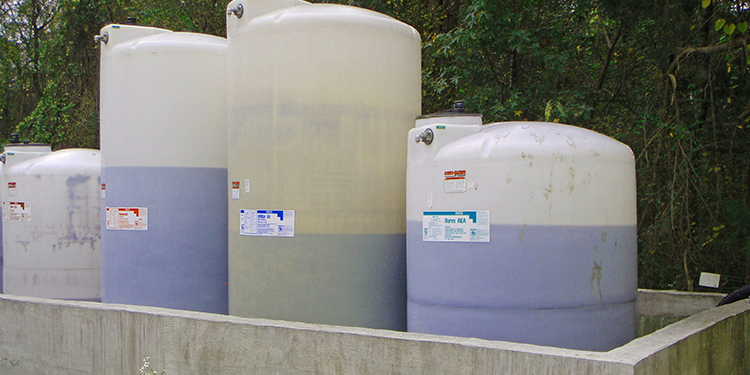TRI Reporting at concrete plants is becoming a issue to the ready mix and precast concrete industries.
We've been actively involved with the concrete industry for well over 20 years, and in the last few years, TRI Reporting is becoming a bigger and bigger issue.
Did you see the recent news bulletin from the USEPA about a concrete producer who was fined a considerable amount for failing to conduct required Toxic Release Inventory Reporting at their facility? If not, long story short is they should have been doing reporting, got in trouble, and got smacked with a considerable fine.
Simply put, they didn't report on the processing of certain toxic chemicals at their concrete plant. Toxic chemicals?! At a concrete plant?! You heard right folks. This isn't a special producer, or a wildly different type of facility. There are several common products and materials present at every concrete plant which may trigger the need to conduct reporting.
TRI Reporting at Concrete Plants
In the above article, a Washington state concrete and asphalt producer failed to do their required TRI Reporting for the processing of certain listed toxic chemicals - chiefly lead in cement - to the Federal USEPA and state and local emergency planning agencies.
This clearly indicates the USEPA's intent to vigorously enforce what many producers commonly call 'Form R Reporting.' What I see as the biggest issue here is the EPA including substantial fines when they feel it is justified for failure to report. I've been involved with a few producers who have had to pay fines well into the 6 figure range, with one producer facing a 7 figure fine. Folks, this is no joke.
If you are using cement at your facility and you haven't been evaluating your applicability for Toxic Release Inventory Reporting your lead and other chemicals content in your cement, slag cement, and fly ash used, now is the time! The USEPA has drawn a line in the sand that says you need to on your cement, regardless of whether it's listed on the cement SDS or not. At this point, industry common knowledge points to the likely presence of lead, mercury, and other chemicals in the cement used at the plant. The EPA, state concrete associations, NRMCA, and the Portland Cement Association all know the chemicals are in there. You can't play dumb anymore, the EPA isn't buying it.

Not sure what TRI Reporting is all about?
- Toxic Release Inventory Reporting regulations require that you report the processing or manufacture of over 25,000, 10,000, 100, 10 pounds of certain listed toxic chemicals. The threshold varies by chemicals. The worse the chemical, the lower the threshold.
- You then have to report on the chemicals, as well as how they are released to the environment. Sometimes they're not released, sometimes they are.
- This is NOT the same as Tier II reporting. Different chemicals, different thresholds, different requirements, different deadlines. Not the same!
Typically, at a concrete plant, the chemicals of main interest are nitrates in certain types of admixtures and lead and other chemicals in cement and SCMs. Depending on production and levels of chemicals in cements, you may have to report for several different chemicals. Additionally, since it's called Toxic Release Inventory Reporting, you'll have to evaluate release potentials, and report on them as well. It can get somewhat confusing...

What if my concrete plant doesn't do TRI Reporting?
What if you don't do this? Expect strong enforcement action soon! The USEPA is serious about cracking down on the concrete industry, and they don't look favorably upon those who haven't been doing their required reporting. If you think you might need to do it, evaluate your situation. If you're not sure, call an expert and ask for some help. If you don't think you have to do it, you better have a darn good story for when the EPA shows up and asks you why you're not doing it.
Another scary factor is, even if you've been trying, but have done the reporting incorrectly, the EPA is still going to hit you with enforcement actions. Fines, penalties, mandatory environmental management systems, such as an ISO 14001 EMS or NRMCA Green-Star, and other enforcement actions. You absolutely have to make sure you're doing this correctly.
Regardless of where you stood in the past, it is absolutely critical for you to find out where you are today with regards to Form R Reporting. This is not something to be ignored. Reporting is no joke, and enforcement is becoming a serious manner. Get in compliance, or risk becoming the next USEPA news release!

Contact Concrete Industry Environmental Experts
Are you running a concrete plant and need help? If so, you've come to the right place. RMA has been actively involved in the concrete industry since our founding in 1992, including staff members from RMA serving on numerous boards and committees for state associations, NRMCA, and NPCA. We've been an integral part in developing NRMCA's Green-Star EMS, and were instrumental in the development of the NRMCA Environmental Course, and our Principal Environmental Consultant Doug Ruhlin has taught the course every year since it's inception.
Long story short, we know the ins and outs of the environmental problems concrete plants face better than anyone else. We've been on-site at close to 1,000 different concrete plants across the country, so when we say we've seen it all and done it all, we mean it. We've helped some of the biggest players in the industry on multi-state projects, as well as small mom and pop concrete producers running a handful of trucks. No matter your size, or the type of concrete you produce, we can help.
So if you're having any type of issue at your concrete plant, we'd love to talk and learn how we can help. Even if we can't help, chances are pretty good we know who can help you, and we'd love to get you in touch with the right people to fit your needs
To reach out, feel free to shoot us an email at info@rmagreen.com, click here to contact us, or give us a call anytime at 888-RMA-0230 to learn how we can help your concrete plant deal with environmental regulations.
Additional Concrete Plant TRI Reporting Articles
TRI Reporting at Concrete Plants - What you need to know!
Do concrete plants need to do TRI Reporting?
4 Must Knows About TRI Reporting at Concrete Plants















